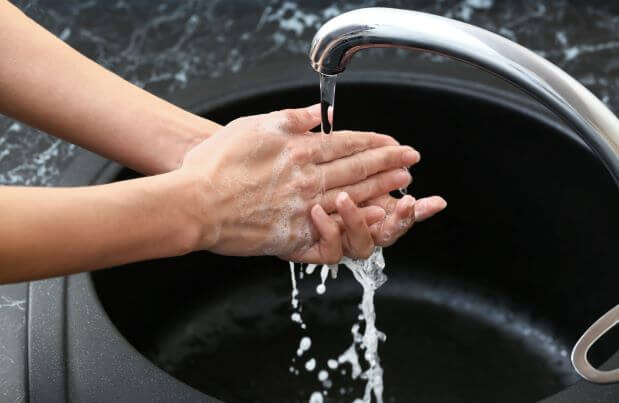Most eczema sufferers know that long showers, hot bubble baths, and using harsh, chemical-laden soaps can cause flareups, but what happens when you have to wash your hands regularly with antibacterial soaps? During the coronavirus (COVID-19) pandemic, many patients with eczema have been dealing with more serious flareups of their skin condition, especially around the hands. In this blog, Dr. Roopal Bhatt of U.S. Dermatology Partners affiliate Four Points Dermatology in Austin, TX., walks through the potential concerns for eczema sufferers who are washing their hands more frequently and how to combat flareups. According to Dr. Bhatt, “It’s important to keep hands clean, especially if you’re going to be out in public as more stores and other businesses are opening their doors, but harsh antibacterial hand soaps can trigger eczema flareups. It’s more important than ever for eczema patients to stay in touch with their dermatologists and keep up their regular skincare routines.”
What is Eczema?
Eczema is an umbrella term that refers to a group of skin conditions that lead to irritation, inflammation, and itching. According to Dr. Bhatt, “The most common form of eczema is atopic dermatitis, and this is what most people think of when they hear the word eczema. This condition is often diagnosed for the first time in childhood, and it causes redness and itching of the skin on the face, arms, and legs. The irritation can occur on other parts of the body as well, and adults can also develop eczema. However, this is much less common.” Similar to other chronic conditions, like psoriasis, eczema is a skin condition that flares up as a result of an overactive immune response. While psoriasis actually starts in the immune system, the overactive immune response that eczema sufferers experience stems from a flaw in the skin itself. While the underlying cause of eczema isn’t clear, the direct cause of the skin irritation is that the skin is less effective at retaining moisture and protecting against irritants. The result is that those who struggle with eczema, especially atopic dermatitis, have very sensitive skin. They are more likely to break out in hives, experience skin allergies, develop abnormally dry skin, and notice other symptoms related to skin sensitivity. In addition to atopic dermatitis, some of the other forms of eczema include:
- Contact dermatitis – caused by exposure to or repeated contact with chemicals, allergens, and other environmental irritants that lead to flareups in skin health issues.
- Dyshidrotic eczema – more common in women, this is a form of eczema that is often related to allergic response during the spring allergy season. Flareups typically impact the hands and feet.
- Nummular eczema – this is one of the rarest and most difficult to diagnose forms of eczema. It takes its name from the Latin word for coin because most flareups create coin-shaped areas of irritation on the skin.
- Seborrheic dermatitis – a chronic form of eczema that is concentrated around sebaceous (oil-producing) glands on the back, face, and scalp. In infants, this condition is very common and referred to as cradle cap, but adults (usually between 30 and 60) can also develop this condition.
- Stasis dermatitis – typically appears on the lower legs and is caused by poor circulation. When pressure builds up in the veins, fluid leaks out causing inflammation, discoloring, swelling, and itching skin.
How Does Overwashing Impact Eczema?
Everyone with eczema experiences different levels of irritation from a variety of internal and external triggers. For this reason, it’s important to work with a dermatologist to identify your individual triggers, so you can avoid them or limit contact. Regardless of the type of eczema or location, almost all eczema sufferers will have an adverse response to overwashing. According to Dr. Bhatt, “If you think of healthy skin as a jar filled with water, eczema skin is a jar with tiny cracks in it. You may not even notice at first that moisture is seeping out. Over time, the water running through the broken parts of the jar makes the cracks larger if they’re not repaired. For eczema skin, repair means applying moisturizers, avoiding irritants, and taking other steps to keep skin healthy and prevent the loss of moisture.”
One main way that eczema sufferers strip moisture from their skin every day is through handwashing. In most cases, people use strong, antibacterial hand soaps to remove germs and other contaminants from their skin, but for people with eczema, these soaps are also stripping away a lot of moisture. As the moisture is pulled from their skin more quickly, they will be susceptible to flareups that can cause dry, brittle skin, bumps, rashes, itching, and sores. In the short term, this makes keeping clean hands uncomfortable since repeatedly washing the dry, damaged skin is painful. In the long term, the extreme dryness and other symptoms can lead to more severe flareups that spread to other parts of the body. These flareups can overtax the immune system, leaving eczema sufferers exposed to increased risk for infection, including viral infections like COVID-19.
How Can I Prevent Skin Health Concerns Related to Eczema & Overwashing?
According to Dr. Bhatt, “It can be very frustrating to hear that the very thing you’re doing to protect yourself may actually be increasing your risk for a scary disease like COVID-19. Many eczema sufferers are experiencing severe flareups related to stress and overwashing right now, and these flareups are putting their immune systems to work to repair the skin damage, which can make it more difficult for the body to fight off other health stressors like viruses and bacterial infections. It may seem overwhelming to add one more thing to your daily routine, but the easiest way to prevent Eczema flareups from overwashing is to apply a moisturizer every time you wash your hands.” Dr. Bhatt gave the following tips to keep your hands healthy when you need to wash frequently:
- Moisturize – Put a good, cream-based moisturizer near every sink in your home, so you remember to apply moisturizer each time you wash.
- Protect – If you notice that certain parts of your hands are drying out, typically the knuckles and cuticles, apply a petrolatum product (petroleum jelly) to these areas to create a barrier to protect your skin.
- Apply a deep moisture treatment – For severe dryness, you can apply petrolatum to your hands and put on a pair of gloves for an hour or two. Some people wear these moisturizing gloves to sleep.
- Change your soap – If you’re using soaps with harsh chemicals and fragrances, choose a fragrance-free product that is made for sensitive skin instead. Many antibacterial soaps are specifically formulated for individuals who struggle with skin sensitivity. Check your labels and ask your dermatologist for recommendations.
How Can U.S. Dermatology Partners Help with Eczema?
In addition to taking these steps to protect your hands from the effects of overwashing, you should also be partnering with a dermatologist to keep your skin healthy. Make sure you continue to follow any treatment plans you already have in place for eczema flareups, including using your prescription topical and/or oral medications as directed. If you have a serious flareup, you should consider reaching out to U.S. Dermatology Partners for an appointment. Your dermatologist can help you adjust your at-home skincare routine, answer your questions, and refill or provide new prescriptions.
When Should I Schedule an Appointment at U.S. Dermatology Partners?
If you’re experiencing a severe flareup, you can’t get your eczema symptoms under control, or you’re unable to continue your regular daily routine due to severe eczema symptoms, it’s time to schedule a visit. We offer convenient options to help you get the care that you need. You can request a teledermatology appointment, and in many cases, that’s all it takes to get patients on the right track. Or, if we need to provide more advanced treatments to help you get your eczema under control, our locations are now relaxing restrictions to allow for in-office visits, including eczema treatment. You can request an in-person visit using our simple online form and a member of our team will reach out to confirm your appointment date and time.
Find a location near me
or


